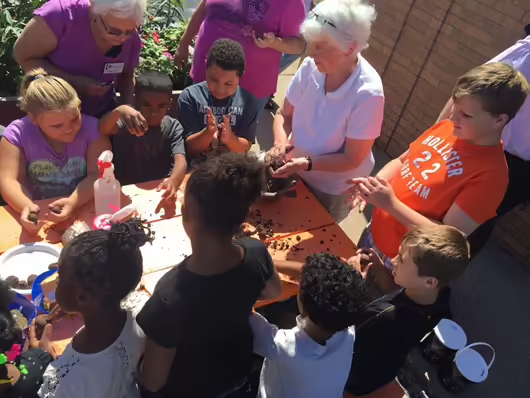
URBANA, Ill. – Just imagine your dinner table without delicious fruits like apples, blueberries, cherries, peaches, or zucchini. Flowering plants and their related pollinators are responsible for a large portion of our food supply - an estimated one out of every three mouthfuls of food. They are also vital, directly or indirectly, for making dyes, medicines, and fibers such as cotton. Pollinators also support plant native plant communities that provide food, nesting, and shelter for wildlife.
Pollinators include butterflies, moths, beetles, hummingbirds, bats, flies, and wasps. Unfortunately, many pollinators are in decline. Yet people can have a positive influence on pollinator populations and diversity, and beautify their landscape by planting pollinator-friendly gardens.
To help educate the community on the important role pollinators’ play in our lives, University of Illinois Extension has received grant funds for pollinator projects in Mercer and Rock Island Counties. The Illinois Clean Energy Foundation awarded the Mercer County Extension & 4-H Foundation with a grant under its new K-12 Pollinator Schools Program. It will reimburse 90% of the cost of installing a pollinator habitat, which the Master Gardener’s planted at the Mercer County Fairgrounds in Aledo.
UI Extension estimates its enhancements to the garden and associated educational outreach to be $3,580. They received 10% matching funds from donors to the Mercer County Ag Literacy program, while McDonald's of Aledo provided funds for the garden’s shade structure.
“The Illinois Clean Energy Foundation grant requires outreach to schools so it fits in perfectly with our Mercer County Ag Literacy programs,” said Teresa Kirwan, who coordinates that program for Mercer County. “In addition to classroom visits to share pollinator lessons, we are making plans to have classes visit the garden this fall.”
Scotts Miracle-Gro awarded the Rock Island County Master Gardeners with $500 to enhance their raised garden beds with pollinator plants. The garden is used for the Master Gardeners’ new Pollinator Patch Summer Day Camp, providing hands-on lessons for youth in grades K – 5.
“Our Master Gardeners have stepped up to the plate to take the lead on these projects, putting their passion for pollinators into action,” said Martha Smith, Extension Horticulture Educator. “They have invested hundreds of volunteer hours in both of these projects: planting and caring for the gardens, researching the best plants to add, building the shade structure, developing curriculum, and leading pollinator lessons.” Smith added, “It’s a testament to the Master Gardener program, showing how Extension is able to provide our volunteers with the tools they need to pursue meaningful change in both personal and community environmental endeavors.”
University of Illinois Extension held a Pollinator Celebration on Wednesday, July 13 during the Mercer County Fair in Aledo, IL. “We planned the event so families could enjoy learning what they can do to save pollinators.” said Smith. It also gave them an opportunity to introduce a University of Illinois Extension’s online resource, the Pollinator Patch, which can be found at go.illinois.edu/pocket. The website offers advice and information to make it easy for people to select, plant, and maintain their own Pollinator Patch so they can do their part to help save our pollinators – and that’s good for everyone!
Photo details: University of Illinois Extension Master Gardener’s Marion Lardner (in white) and Mary Scott work with youth from the Ms. T’s Day Care to make monarch truffles – filling the soil with seeds that will be spread to help create native habitats.
Illinois Extension leads public outreach for University of Illinois by translating research into action plans that allow Illinois families, businesses, and community leaders to solve problems, make informed decisions, and adapt to changes and opportunities.